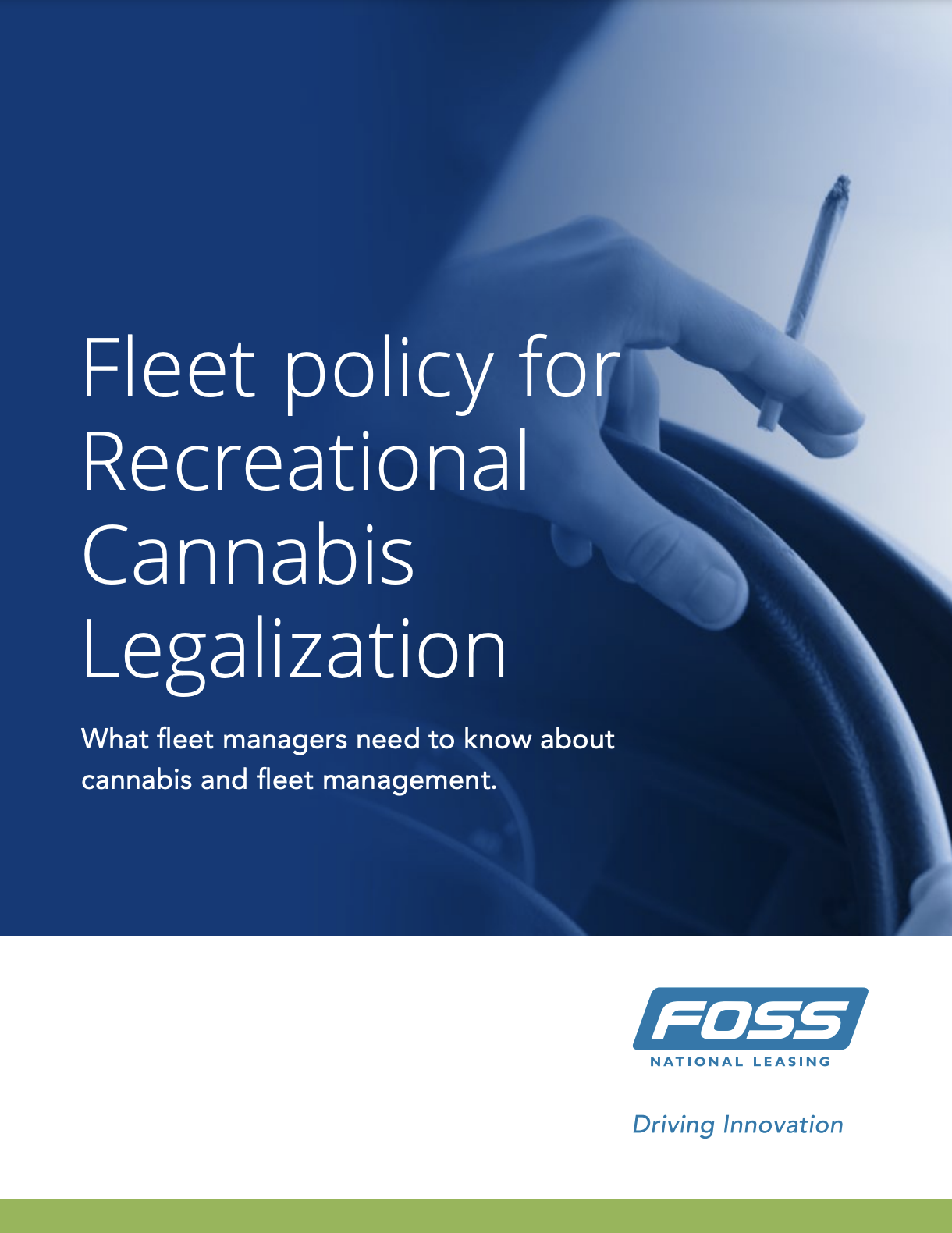
Have questions around handling legalized cannabis in the workplace?
It’s been eight months since cannabis became legal in Canada. All employers have had to adapt —and businesses that employ drivers even more so.
To help you make sure your company policy is up-to-date, we’ve put together a list of common questions fleet managers have on this issue. Use this information as a reference as you update your policy, and as you share it with your team.
ESSENTIAL FLEET MANAGEMENT QUESTIONS ABOUT LEGALIZED CANNABIS
How Should I Address Recreational Cannabis Legalization?
People might assume that legalized cannabis means unrestricted use. However, like alcohol, cannabis impairment will result in serious penalties under the Highway Traffic Act. Under the law, there is a zero-tolerance policy for commercial drivers with A-F class licenses.
There is no established “safe limit” for the amount of tetrahydrocannabinol (THC)—the main mind-altering chemical in cannabis—in the bloodstream. The degree of impairment from THC largely depends on the person consuming it. Factors include not only the amount a person consumes, but also the frequency of consumption.
Therefore, the clearest policy is to ban all smoking in company vehicles. No cigarettes, no vaping, no cannabis. In Ontario, it’s illegal for drivers and passengers to use cannabis in any motor vehicle used for work purposes. In BC, cannabis use is prohibited in all vehicles.
Finally, employers may want to be comprehensive and have your HR department develop not only a vehicle policy, but a company-wide drug policy that applies to office workers as well. Remember: driving under the influence includes driving while ‘high’.
Learn more about impairment in the workplace in our blog: Cannabis and Impaired Driving: What Fleets Need to Know [Interview].
What is the Legal Limit for Cannabis in the Bloodstream?
Drivers can be convicted for exceeding the legal limit for THC in the bloodstream. Drivers who have two to five nanograms of THC per millilitre of blood within two hours of driving would face a summary conviction, and a fine of up to $1,000.
Since this is not deemed a criminal offence under the Highway Traffic Act, it would not appear in the Canadian Police Information Centre, in an employment check, or in a passport application.
Drivers with five nanograms or more would be charged with a hybrid offence, possibly leading to a fine and jail time—akin to being caught with a blood alcohol concentration over 0.08. (Note: for those who consume both cannabis and alcohol at the same time, the legal alcohol limit is lowered to 0.05.)
Can I Subject Drivers to Random Drug Testing?
Legalization does not open up the door for employers to do random drug testing. While drugs and alcohol can impair work performance, testing for substance use in the workplace is unavailable in most workplaces. The Supreme Court of Canada made it clear that employees’ rights to privacy mean that random drug testing is not permissible unless very specific conditions are met.
Only workplaces that are highly safety-sensitive or inherently dangerous can consider random drug testing. Even then, safety-sensitive workplaces are not automatically permitted to introduce it. Employers must always balance employee privacy rights with employer safety obligations before considering drug testing.
That being said, drug testing specific individuals is sometimes permitted in situations where an employee has been involved in an incident, or where an employee might be returning from a substance abuse leave.
Always consult with your HR department and legal counsel before implementing any drug testing policies.
Any Special Rules on Cannabis Edibles or Capsules?
While cannabis ‘edibles’ are still illegal in Canada, the federal government plans to put regulations for legalization in place by Oct. 17, 2019. However, even after edible cannabis is legalized, it should still be strictly prohibited in the workplace.
Keep in mind that cannabis impairment can be influenced by the way in which it is ingested. Smoking cannabis has almost immediate effects, whereas the use of edibles can sometimes take hours to fully appear.
To cover all forms of cannabis, your policy should take into consideration these wide-ranging duration times. Understand that cannabis impairment can show itself at different times and at different intensities.
Can Drivers Get Impaired from Secondhand Smoke?
Unlike tobacco use, the science does not support the belief that second-hand cannabis smoke is impairing. Drivers who test positive for cannabis most likely used cannabis themselves, and arguments that they were near to someone using cannabis are generally not scientifically supported.

How Long Do the Effects of Cannabis Last?
It’s tricky to predict how long the impairing effects of cannabis will last. There are many factors involved that vary from person to person. One important factor is the method of consumption. The effects of smoking cannabis can last a few hours, while ingesting it through edibles can last much longer.
At this stage, the science has not caught up to the law, and testing for cannabis cannot accurately show specific levels of impairment
Can Drivers Transport Cannabis into the US?
Cannabis is still illegal in the United States under Federal law. Since the border is under Federal jurisdiction, this means that any transportation of cannabis over the border is a criminal offence.
Anyone caught doing so could be charged and convicted. Even those not criminally charged could be given a lifetime ban on entering the United States if they’re found to be transporting cannabis across the border.
Anyone crossing the US-Canada border should ensure that they do not have any recreational cannabis on their person or in their vehicle/possession.
(Related post: To Lease or Reimburse? Top 4 Factors to Consider)
Is Medicinal Cannabis Subject to Different Rules?
Medicinal cannabis has been legal in Canada for almost two decades. Much of the framework surrounding medicinal cannabis isn’t new, and won’t change.
As before, all employers are under an obligation to accommodate those employees with disabilities to the point of undue hardship. The Ontario Human Rights Code makes it clear that discrimination based on an employee’s form of treatment is the same as discriminating against the disability itself.
Make sure you have a comprehensive accommodation policy and process in place for medicinal cannabis, as well as for all other forms of medical accommodation. The provinces of Ontario, British Columbia, and Quebec all consider addition to be a disability, and therefore protected from discrimination.
Again, consult with your HR department and legal counsel to ensure you don’t run afoul of any obligations under human rights legislation regarding medicinal cannabis use.
Conclusion
Legalized cannabis is here to stay. Use the above information as a guide as you update your company policy. Keep drivers informed on expectations around cannabis use, and also on the consequences of non-compliance.
Understanding and communicating the laws around consumption—especially as they relate to driving—is key to maintaining a healthy fleet and protecting your business.
Next Step
Download this article as a PDF you can easily access at any time. Get access below.
Get to Know the Author
Dave is a highly motivated, innovative and results-oriented sales executive. He is passionate about coaching and sustaining high-performance teams that enhance the customer experience and achieve business objectives.
He knows the fleet business from the ground up with over two decades of fleet management experience. He has held several senior management roles overseeing new business development, customer satisfaction, account management and operations.
Dave maintains a keen aptitude for continually assessing and adapting to the needs of clients.
Meet our team






